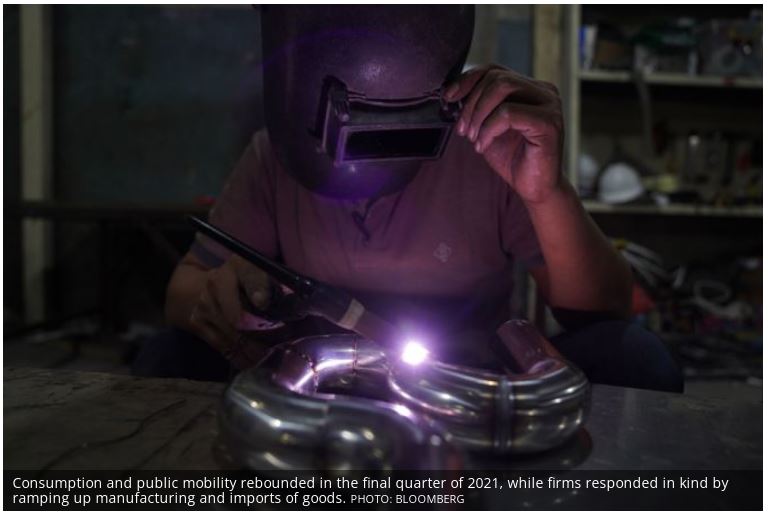Indonesia’s recovery gains pace but virus surge clouds outlook
INDONESIA’S economic growth quickened in the final quarter of 2021, powered by resurgent domestic demand and the global commodity boom even as a virus resurgence looms.
Gross domestic product (GDP) in the three months through December grew 5.02 per cent from a year earlier, the country’s statistics agency said on Monday (Feb 7), against the 4.81 per cent median estimate in a Bloomberg survey of economists and 3.51 per cent the previous quarter.
This brought full-year GDP growth to 3.69 per cent, almost in line with the 3.7 per cent analyst forecast and the government’s growth target of 3.7-4.5 per cent.
Indonesia’s benchmark stock index rose as much as 1.1 per cent after the data was released, on course to close at a record high. The rupiah fell 0.16 per cent to 14,403 to the US dollar as at 1.48pm Jakarta time, its weakest since Jan 31.
South-east Asia’s largest economy had benefitted from a long stretch of low Covid-19 cases that allowed people to return to pre-pandemic habits in the final quarter of 2021. Consumption and public mobility rebounded, while firms responded in kind by ramping up manufacturing and imports of goods.
Exports also emerged as a growth engine for the resource-rich nation, as the recovery in developed nations created a rush for commodities from coal to metals.
“Higher international commodity prices pushed up Indonesia’s exports, which were impressive in the fourth quarter, and that impacted economic growth,” Margo Yuwono, head of the statistics office, said in a briefing, adding that economic activity and government spending accelerated again after being limited due to the virus wave in the previous quarter.
The government hopes the momentum can carry the economy through what could be its worst Covid-19 wave yet due amid the Omicron strain. Daily cases are expected to reach as many as 285,000 this month, more than five times the peak of the Delta outbreak.
“It is a strong print that augurs well for recovery momentum going into 2022,” said Wellian Wiranto, economist at OCBC Bank. “The ongoing Omicron wave remains a tricky speed-bump, with Jakarta reporting its highest case tally recently. While the most stringent of social mobility restrictions may be avoidable, consumer confidence recovery might be less robust than before.”
Coordinating Minister for Economic Affairs Airlangga Hartarto said that public optimism remains strong, estimating that GDP growth could register above 5 per cent this quarter and increase further in the April-June period due to seasonal spending around the Ramadan and Eid al-Fitr festivities.
With cases at a six-month high, authorities raised movement restrictions to the second-highest level in Jakarta, Bandung and Bali in a separate briefing on Monday, cutting operating hours and maximum capacity for malls, supermarkets and restaurants.
The restrictions, which also include limiting capacity at religious and other public places, will be implemented for at least a week, according to Luhut Panjaitan, a Cabinet minister who oversees the nation’s pandemic response in Java and Bali.
Daily cases in those areas have exceeded highs seen during the previous wave, he told an online briefing on Monday. Testing and tracing need to improve and the hospitalisation rate has to decline before the government can ease the restriction levels, with a review set for next week, said Panjaitan.
The country is nearly doubling the number of hospital beds dedicated for Covid-19 patients while flagging that cases could reach as high as 285,000 a day, about five times its previous daily record. Patients filled as many as 18,996 hospital beds out of a national capacity of 120,000 beds dedicated for Covid handling, said Health Minister Budi Gunadi Sadikin at the same briefing.
The capital Jakarta accounts for almost half the additional cases, followed by the provinces of West Java, where the city of Bandung is located, Banten, East Java and Bali. BLOOMBERG


 English
English




